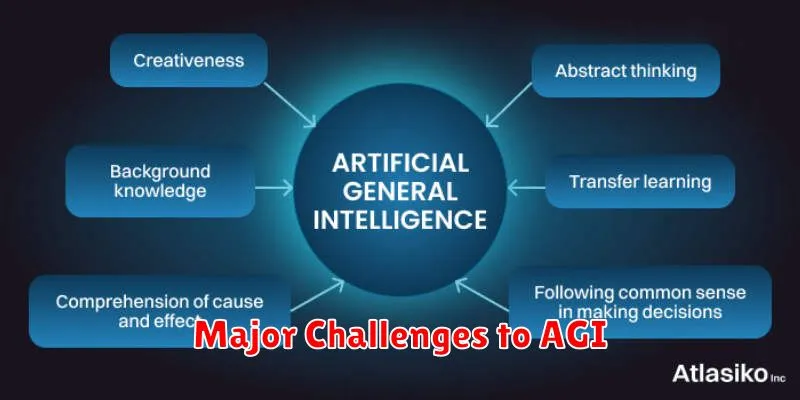Artificial General Intelligence (AGI), often referred to as strong AI or human-level AI, is a hypothetical form of artificial intelligence capable of performing any intellectual task that a human being can. Unlike narrow or weak AI, which is designed for specific tasks like playing chess or recommending products, AGI possesses a broad cognitive capacity, encompassing reasoning, problem-solving, learning, and understanding complex concepts across diverse domains. The development of AGI represents a significant leap beyond current AI capabilities and carries profound implications for the future.
This article explores the core concepts of Artificial General Intelligence (AGI), distinguishing it from existing Artificial Intelligence systems and examining its potential benefits and risks. We will delve into the key characteristics that define AGI, the ongoing research efforts driving its development, and the potential societal impact of achieving true Artificial General Intelligence. Understanding the intricacies of AGI is crucial in navigating the rapidly evolving landscape of artificial intelligence and preparing for a future where machines possess human-level cognitive abilities.
Defining AGI vs Narrow AI
A key distinction in artificial intelligence lies between Artificial General Intelligence (AGI) and Narrow AI. Narrow AI, also known as weak AI, is designed for a specific task. Examples include spam filters, facial recognition software, and virtual assistants. These systems excel in their designated areas but lack general cognitive abilities.
AGI, or strong AI, represents a hypothetical level of artificial intelligence where a machine possesses cognitive abilities comparable to a human being. An AGI system could theoretically perform any intellectual task a human can, including learning, reasoning, and problem-solving across diverse domains.
Why AGI Matters for the Future
Artificial General Intelligence (AGI) holds immense potential to reshape our future. Its capacity to learn, reason, and problem-solve across a wide range of domains distinguishes it from narrow AI. This generalized intelligence could revolutionize various sectors.
In scientific discovery, AGI could accelerate research and development in fields like medicine and materials science. Its ability to process vast amounts of data and identify complex patterns could lead to breakthroughs previously unimaginable. Furthermore, AGI could optimize complex systems, improving efficiency and resource management in areas like energy and logistics.
Major Challenges to AGI

Developing Artificial General Intelligence (AGI) faces significant hurdles. Common sense reasoning remains a major obstacle. While AI excels in specific tasks, AGI requires the ability to understand and apply general knowledge in novel situations, much like humans do.
Transfer learning presents another challenge. Current AI models struggle to apply knowledge learned in one domain to a different one. AGI needs to generalize knowledge effectively across diverse areas.
Furthermore, consciousness and self-awareness, though not universally agreed upon as requirements, pose complex philosophical and technical problems for AGI development. Reproducing these human traits in machines is a formidable challenge.
Leading Institutions and Researchers
Several institutions are at the forefront of AGI research, pushing the boundaries of AI capabilities. DeepMind, acquired by Google, is a prominent example, known for its work on AlphaGo and other groundbreaking projects. OpenAI, a leading AI research company, focuses on ensuring that AGI benefits all of humanity. Other key players include the Future of Humanity Institute at Oxford University and the Machine Intelligence Research Institute (MIRI), which explore the potential impacts and safety considerations of advanced AI.
Notable researchers in the field include Demis Hassabis (DeepMind), Ilya Sutskever (OpenAI), and Stuart Russell (UC Berkeley). Their work contributes significantly to our understanding and development of AGI.
Ethical Considerations in AGI Development
Developing Artificial General Intelligence (AGI) presents significant ethical challenges. A key concern is control. Ensuring AGI aligns with human values and intentions is crucial to prevent unintended consequences.
Bias in training data can lead to discriminatory outcomes, requiring careful data curation and algorithm design. Furthermore, the impact on human labor must be considered. Widespread AGI adoption could displace workers, necessitating societal adaptations.
Finally, questions of AGI rights and consciousness may arise as these systems become more sophisticated, demanding careful philosophical and societal reflection on our responsibilities.
Predictions for AGI Breakthroughs
Pinpointing the exact arrival of Artificial General Intelligence (AGI) remains elusive. Expert predictions vary significantly, ranging from highly optimistic timelines within the next decade to more conservative estimates of several decades or even centuries. The inherent complexity of replicating human-level intelligence contributes to this uncertainty.
Several factors influence these predictions. Progress in fields like neuromorphic computing and quantum computing could accelerate the development of AGI. Conversely, unforeseen technical hurdles could significantly delay its realization. Ethical considerations and regulatory frameworks will also play a crucial role in shaping the development and deployment of AGI.

